Russia Launches 25 Iranian Drones Against Ukraine’s South
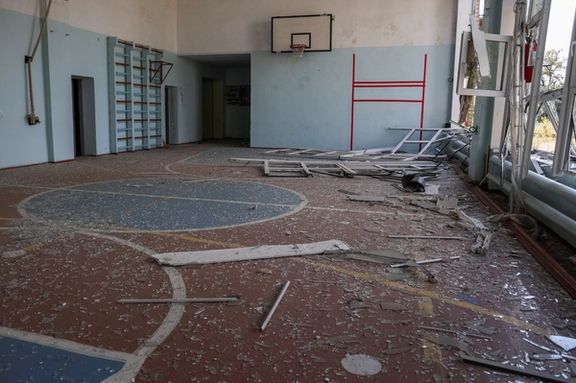
Russia launched 25 Iranian kamikaze drones on the southern parts of the Odesa region on Sunday, where Ukraine has its crucial grain export Danube ports.

Russia launched 25 Iranian kamikaze drones on the southern parts of the Odesa region on Sunday, where Ukraine has its crucial grain export Danube ports.
The Danube has become Ukraine's main route for exporting grain since July, when Russia quit a UN and Turkey-brokered deal that had given safe passage to Kyiv's exports of grains, oilseeds and vegetables oils via the Black Sea.
Sunday's attack took place the day before Russian President Vladimir Putin and his Turkish counterpart Tayyip Erdogan are due to hold talks in the Russian Black Sea resort of Sochi. Turkey has been pressing to revive the grain deal.
Ukraine's South Military Command said on social media that at least two civilians were injured in the early morning attack on what it called "civil infrastructure of the Danube".
The Ukrainian Air Force said air defence systems shot down 22 of the 25 Iranian-made Shahed drones launched by Russia.
Iran has been supplying hundreds of its Shahed drones to Russia since mid-2022 but denies there were delivered to be used for attacks on Ukraine. The Western alliance supporting Ukraine has imposed sanctions on individuals and companies involved in supplying the drones.
The military said a fire that resulted from the attack at one facility was quickly extinguished.
The Russian Defense Ministry was quoted by Interfax as saying that a group of Russian drones successfully struck fuel depots at the Reni port used by the Ukrainian military.
"Russian terrorists continue to attack port infrastructure in the hope of provoking a food crisis and famine in the world," the Ukrainian president's chief of staff Andriy Yermak wrote on Telegram.
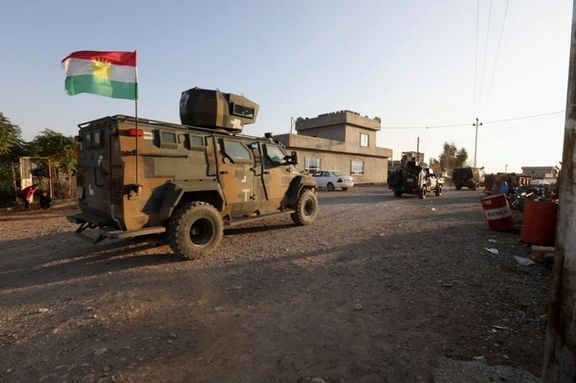
Iraqi security forces deployed in the northern city of Kirkuk on Sunday as Iran-backed militias have killed several Kurds and continue to threaten more attacks.
According to police and security sources, four Kurds were shot dead and 15 people were wounded during the clashes in the city, controlled by the Iraqi government and home to diverse groups of people including Kurds, Turkmens, and Arabs.
Amir Shwani, a spokesman for Kirkuk police, said in a statement that a curfew had been lifted and vehicles were moving normally in the city on Sunday, but security forces had deployed additional troops to "prevent violence and protect civilians."
The city has been a point of contention, witnessing disputes between Kurdish forces and the Iraqi government. Iranian-backed militias have recently escalated aggression in the region, firing rockets to target gas fields on the road to Sulaymaniyah, a large city in the Kurdistan autonomous region about 100 kilometers west of Kirkuk.
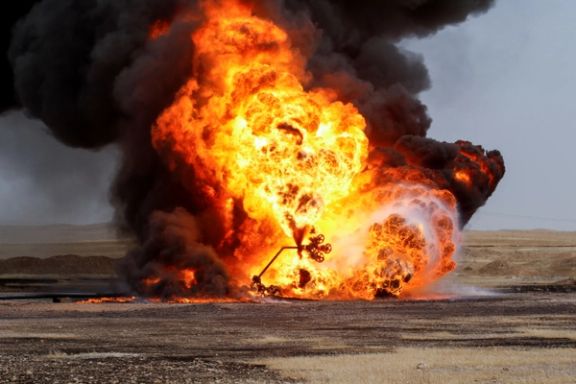
The clashes followed days of tensions over a building in Kirkuk that was once the headquarters for the Kurdistan Democratic Party (KDP) but was used by the Iraqi army as a base since 2017. Iraq's federal supreme court issued an urgent ruling on Sunday obliging the government to delay procedures regarding the handover of the building to the KDP.
Kirkuk, an oil-rich province in northern Iraq along the fault lines between the Kurdish autonomous region and areas controlled by Iraq's Shiite-dominated central government, has been the focus of some of the country's worst post-Islamic State violence. Arab residents and minority groups, who say they suffered under Kurdish rule, have protested the KDP's return to the city.
“Dozens of protesters, mainly members of the Iran-backed Asaib Ahl al-Haq militia and their supporters, have set up tents near the JOC headquarters since Sunday evening in protest to the potential return of the KDP. They have blocked access to the highway and vowed to continue their demonstration until [Prime Minister Shia al-Sudani retracts his decision,” Rudaw Kurdish news agency reported reported.
Similar clashes are also happening between Kurdish-led forces and groups of Islamic militias and tribes in eastern Syria. The violence has killed 49 fighters from both sides and eight civilians, according to the Syrian Observatory for Human Rights war monitor.
The involvement of the pro-Iran militias also has another dimension. Late in August, Iran and Iraq formalized an agreement to dismantle Iranian Kurdish dissident factions stationed in the northern reaches of Iraq and relocate them from their bases.
Nasser Kanaani, spokesperson for Iran's Foreign Ministry, said the Iraqi government had undertaken the commitment "to disarm the armed terrorist groups stationed in Iraq's territory by September 19, and subsequently, evacuate and transfer them from their military bases to camps designated by the Iraqi government."
Historically, Iran has intermittently executed targeted operations against the Kurdistan Democratic Party in Iran (KDPI) and other Iranian Kurdish dissident elements operating within Iraq's semi-autonomous Kurdish region, adjacent to Iran's borders.
Various Iranian dissident factions in Iraq have aligned their allegiances with the two principal Iraqi Kurdish parties: the Kurdistan Democratic Party, headquartered in Erbil, and the Patriotic Union of Kurdistan party, with its stronghold in Suleimaniyah.
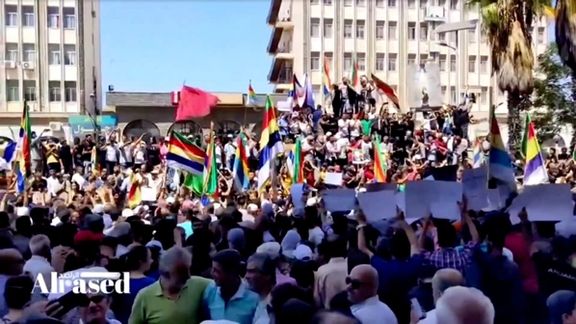
Syrian protesters continue to urge President Bashar al-Assad to step down and Iran leave the country, as economic conditions deteriorate.
Hundreds gathered in southern Syria on Friday capping nearly two weeks of demonstrations that erupted over poor living conditions but have spiraled into renewed calls for political change.
"Bashar out, Syria free!" shouted a large crowd in the southern Druze city of Sweida. "Syria is not a farm, we are not sheep," read another poster.
Dozens also gathered on Friday in the province of Daraa, where the 2011 protests kicked off. They carried the three-star flag emblematic of Syria's uprising, as well as signs criticising the role of Iran, which has supplied troops, weapons and money to Assad since 2011.
Syria is in a deep economic crisis that saw its currency plunge to a record 15,500 Syrian pounds to the dollar last month in a rapidly accelerating free-fall. It traded at 47 pounds to the dollar at the start of the conflict 12 years ago.
Demonstrations broke out in Sweida in August over the removal of fuel subsidies. Home province of most of Syria's Druze community, Sweida remained in government hands throughout the war.
Open criticism of the government remained rare in the areas it controls but as the economic situation grew worse, the discontent has gone public.
Residents of other government-held parts of Syria - where restrictions are tighter - have made more discrete gestures of protest to avoid detection by government forces.
In the coastal province of Tartus on Thursday, some residents held up small postcards reading "Syria belongs to us, not to the (ruling) Ba'ath party", according to photographs posted on activists' social media pages.
Reporting by Reuters
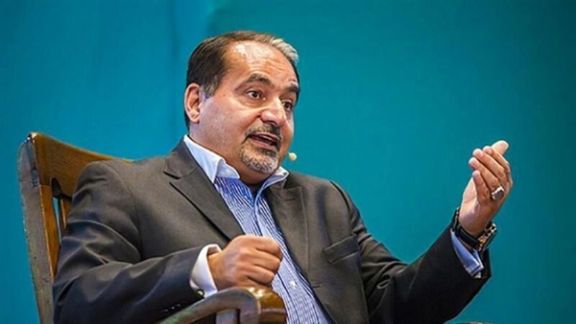
Lawmakers have written to Gen Anthony J. Cotton to probe why an Iranian regime insider was invited as a key speaker to the recent STRATCOM Deterrence Symposium.
The chair of the US House Armed Services Committee Mike Rogers (R-Ala.), and the ranking member of the Senate Armed Services Committee, Sen Roger Wicker (R- Miss.) have asked Gen. Cotton for details about those involved in the decision to invite Hussein Mousavian, a former high-ranking Iranian official. Mousavian who is a faculty member at Princeton has been praised in the past by former Iranian foreign minister Javad Zarif about his role in advocating for the policies of the regime in the United States.
The affair in mid-August that was revealed earlier this week led to an uproar on social media. Former US officials, analysts and Iranian activists condemned the move by the US military to invite Mousavian. Some quipped that perhaps Vladimir Putin and other US adversaries should also be considered as speakers as Pentagon events.
The lawmakers pointed out in their letter that Mousavian is “A propagandist of the regime since 1980, Mousavian served as the Iranian regime’s Ambassador to Germany in 1992 when the regime’s intelligence operatives assassinated four Iranian dissidents in Berlin. In response, German authorities forced Mousavian to leave the country along with several other Iranian “diplomats” and intelligence operatives.“
Mousavian made headlines last year for bragging about revenge against American officials over the targeted killing of IRGC's Quds Commander Qasem Soleimani. In January 2022, his remarks in a documentary made in Iran to mark Qassem Soleimani’s death anniversary led to controversy when he gloated about how Iran’s threat to avenge Soleimani killing frightened the wife of Brian Hook, Washington’s special envoy for Iran at the time. “An American told me that Brian Hook’s wife had not slept for several days and that she was shaking and crying. That’s how afraid they were” Mousavian said gleefully in the documentary.
A STRATCOM spokesman later told the Washington Free Beacon that "We were aware of Mr. Mousavian’s previous position within the Iranian government and believe that... we would have benefited from that insight into an opposing viewpoint."
The lawmakers sharply criticized the move to invite Mousavian and said, “While we appreciate the importance of improving our understanding of adversary perspectives and motivations in formulating deterrence policies, providing Mousavian with an officially sanctioned U.S. Government platform for spreading historical falsehoods and Iranian regime propaganda is profoundly ill-advised.“
They went on to ask Gen. Cotton to provide “the names and positions of all officials responsible for approving the invitation to Mousavian,” and asked if STRATCOM provided “compensation for transportation, lodging or a per diem to Mr. Mousavian? Was Mousavian provided with an honorarium? If so, how much?“
Many critics had raised questions about whether US taxpayer funds were used to pay an Iranian regime advocate to appear in the STRATCOM event.
Earlier, other lawmakers had already voiced frustration over the incident. "Mousavian helped lead the murderous Iranian regime’s efforts to obtain nuclear weapons so it could threaten the United States and our allies with annihilation," said Rep. Jim Banks (R-IN), a member of the House Armed Services Committee. "Now he’s in semi-retirement at Princeton as a full-time propagandist for the IRGC. Inviting him to spread lies at a US military seminar is insanity."
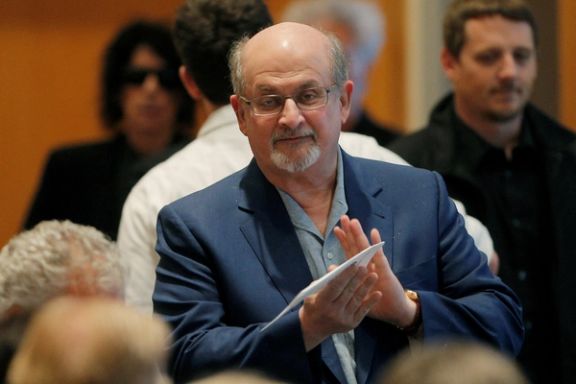
The investigation into last year’s nearly fatal attack on Salman Rushdie has expanded to explore potential international involvement, according to a US district attorney.
Jason Schmidt, the US district attorney overseeing the case, revealed a separate inquiry led by the US federal government, specifically the US Attorney's Office into the case of Hadi Matar with a focus on Iran. Matar, a 25-year-old man accused of stabbing Rushdie multiple times during the writer’s appearance at a summer cultural festival last August is now accused of having possible connections to foreign entities.
“There are some areas that we have to sort of confine ourselves to the four corners of the charges that we've asserted, which is essentially an attempted murder in the second-degree charge. That's our top count,” said Schmidt.
This scrutiny is linked to Iran's historical involvement due to Ayatollah Khomeini's 1989 fatwa against Rushdie because of what he asserted were sacrilegious sections regarding Islam in Rushdie's novel, "The Satanic Verses."
Iranian religious groups have also offered rewards for Rushdie, with such offers extending as recently as last year.
While Matar's assault on Rushdie was initially seen as an individual act, concerns have arisen regarding foreign support, especially given Matar's time in Lebanon and his possession of a counterfeit Hezbollah-related ID.
The investigation's complexity extends beyond local jurisdiction, involving national security and diplomacy amid ongoing negotiations with Iran.
Experts suggest that Matar was possibly influenced by Hezbollah during his time in Lebanon and that this may have played a role in his alleged attack. Iran has denied direct involvement but expressed support for the attack.
The focus of the investigation remains on Matar, with the US State Department imposing sanctions on an Iranian organization linked to bounties on Rushdie.
Tensions between the US and Iran have escalated in recent years, marked by events such as the assassination of General Qasem Soleimani and alleged plots against US officials.
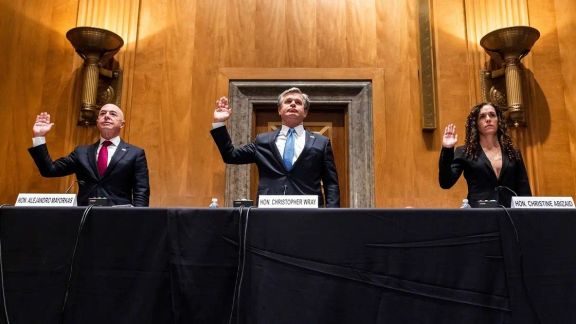
As information about secret talks with Tehran remain scarce, US lawmakers demand to know how American officials are being protected against Iran’s threats.
Reps. Mark Green (R., Tenn.), the House Homeland Security chair, and August Pfluger (R., Texas) have written to Homeland Security Secretary Alejandro Mayorkas, FBI Director Christopher Wray and Director of National Counterterrorism Center Christine Abizaid, “to request additional information about the persistent threats posed by Iran’s campaign to direct operations against U.S. persons or other targets in the U.S. homeland.”
Since the targeted killing of Qasem Soleimani, Iran’s top military and intelligence operator in the Middle East, in January 2020, the Iranian regime has repeatedly threatened revenge of former Trump administration officials.
The Justice Department revealed on August 10, 2022, that an operative of Iran’s Revolutionary Guard tried to hire a hitman in the US to kill former National Security Adviser John Bolton.
Bolton told Iran International Television at the time that he was not surprised an indictment was unsealed because he was kept informed “in general terms until late in 2021 when it was determined I would again get secret service protection.”
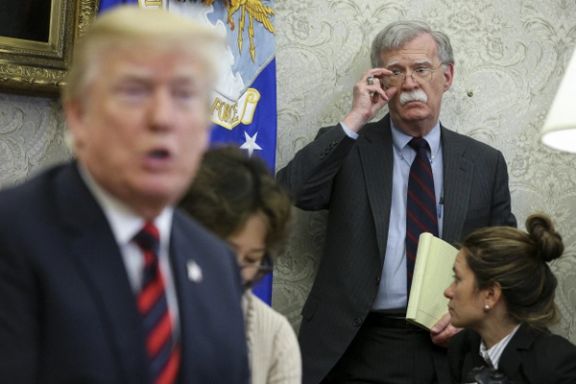
Congressmen Green and Pfluger citing Bolton’s case also mentioned threats against former Secretary of State Mike Pompeo and others. “Further, credible threats by Iran have continued to persist against Pompeo as well as his former top aide, Brian Hook, who served as special representative for Iran during the prior administration.”
The letter cited Iran’s militant proxy the Hezbollah, which is designated as a Foreign Terrorist Organization by the United States, and its global reach. It cited testimony by FBI Director Wray who told Congress that the Lebanese Shiite group has sent operatives “to build terrorist infrastructure worldwide. The arrests of individuals in the United States allegedly linked to Hizballah’s main overseas terrorist arm, and their intelligence collection and procurement efforts, demonstrate Hizballah’s interest in long-term contingency planning activities here in the Homeland.”
The lawmakers expressed concern that the Biden administration continues to engage with Iran for a nuclear deal, while these activities continue.
“To assist the Committee’s examination of the threats posed by Iran in the U.S. homeland, we request that DHS, the FBI, and NCTC provide Committee staff a classified briefing no later than September 14, 2023 about these ongoing threats, to include but not limited to, information about the number of active plots by Iran or its proxies against U.S. persons living in the United States, as well as information about your respective agencies’ coordination efforts for threat intelligence to counter Iran’s activities,” the letter said.
In August the administration agreed to allow $6 billion of frozen Iranian funds in South Korea to be unblocked, after allowing $2.7 billion to be released from Iraq in June. Although the reason for these steps is presented as a hostage release deal, numerous reports have indicated the possible existence of more secret arrangements.
Iran has reportedly reduced the pace of its uranium enrichment, while the Biden administration look the other way as Tehran boosts its oil exports to China in violation of US sanctions. Iran’s oil exports in August reached nearly 2 million barrels per day, regaining almost all its lost market since the Trump administration withdrew from the JCPOA nuclear agreement and imposed sanctions in 2018.






